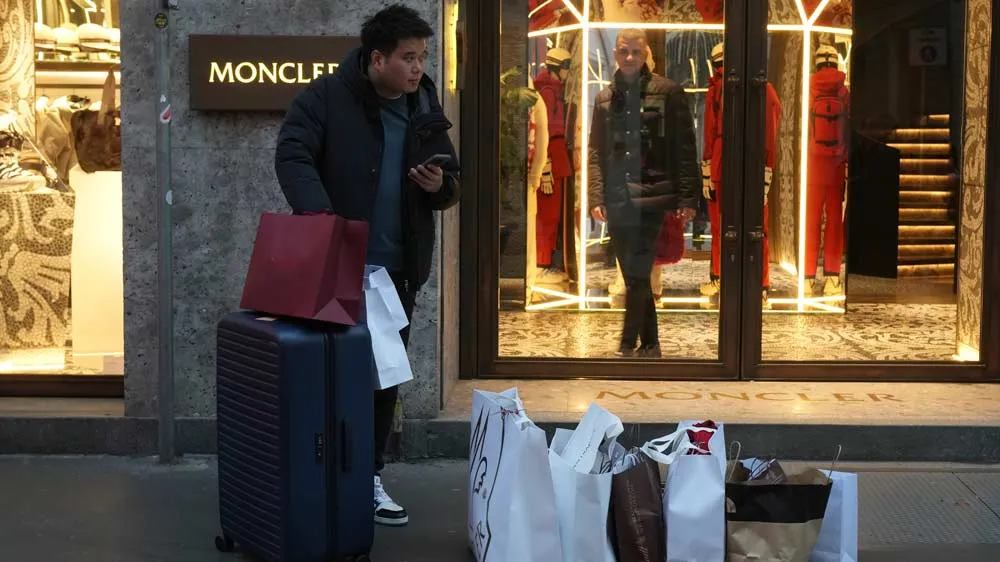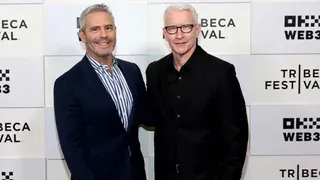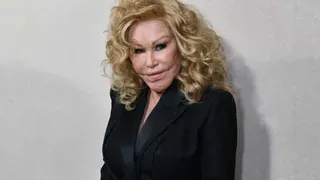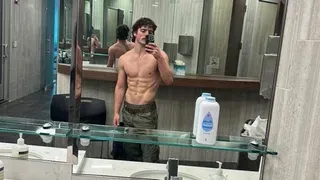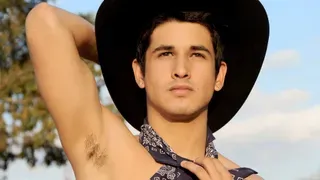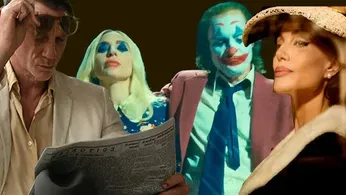
September 9, 2024
Missive from Venice – What Were the Queer (and Queer Adjacent) Films?
Frank J. Avella READ TIME: 13 MIN.
The 81st Venice International Film Festival did not boast many queer films besides the obviously titled, highly-anticipated "Queer," an extraordinary Norwegian film, "Love," and a disturbing Italian movie, "Labyrinths."
There were, however, several queer-friendly and queer-adjacent offerings featuring queer artists (out filmmakers Pedro
Almodóvar and Pablo Larraín) and gay icons such as Lady Gaga, Angelina Jolie, Nicole Kidman, Julianne Moore, and Tilda Swinton.
For those looking for off-screen drama, there was little to be had. Even Joaquin Phoenix behaved and deferred commenting on his withdrawal from Todd Haynes' gay-explicit film just five days before filming. Kevin Costner didn't complain too much about the poor reception to his "Horizon" sequel and its being bypassed for theatrical release. There was no Pitt-Jolie confrontation. (Brad and Angelina's films were carefully programmed two days apart.)
There was a lot of glamour on the red carpet and wild paparazzi screaming at celebs as they arrived via vaporetti (water taxis), from the above-mentioned divas to Cate Blanchett to Catherine O'Hara to Clooney and Pitt to Daniel Craig.
As always, a host of Italian films could easily be tagged homoerotic, despite the fact that those filmmakers were still too afraid to take the next step with their characters ("The Story of Frank and Nina," "Familia," "Campo di battaglia," "Diciannove").
Here are some of the most significant of the Queer and Queerish titles.
'Love'

Norwegian helmer Dag Johan Haugerud has created a thought-provoking, mesmerizing queer-and-sex-positive gem with his fourth feature, "Love."
This is the second film in a trilogy. The first, "Sex," was part of the Berlin International Film Festival earlier this year, and was about a married straight man who has sex with another man. "Dreams," the final film, will open in 2025.
Set in Oslo in the month of August, the film follows two separate healthcare workers, Marianne (Andrea Bræin Hovig), a urologist, and Tor (super-sexy Tayo Cittadella Jacobsen), a gay male nurse she works with. They spend their days talking prostate cancer patients through treatment options and their nights searching for some kind of intimacy. Okay, that sounds like the plot to "Looking for Mr. Goodbar." It's not. At all.
Marianne is not looking for marriage, but has met a seemingly nice, recently divorced geologist, Ole (Thomas Gullestad), thanks to her slightly-flighty bestie, Heidi (Marte Engebrigtsen, excellent). Tor is an unashamedly sexual being, proud of his many sexual encounters and not looking for a relationship (or so he says). One day, riding the ferry, Tor shares his feelings about casual sex with Marianne, who is very intrigued and, a bit later, finds herself having sex with a stranger and wholly enjoying it.
After a non-sexual ferry encounter with an older psychologist, Bjorn (Lars Jacob Holm, heartbreaking), Tor finds himself intrigued by the man and begins to pursue him.
Hovig and Jacobsen are both terrific. They create an authentic bond between Marianne and Tor.
The film is audacious in its non-judgmental approach to different kinds of intimacy. One man's sexual permissiveness (and even that word has negative connotations) is seen as being as good and pure as another person's simply wanting to find someone to love.
'Queer'

Already quite divisive (and what Luca Guadagnino film isn't?), "Queer" is bound to spark many social media arguments, from its sheared running time, to its (rather tame) depiction of gay sex onscreen, to its predominant straight-actor cast, to its trippy slow burn narrative.
Based on the Beat generation novella by William S. Burroughs ("Junkie," "Naked Lunch"), and written in the early '50s but not published until 1985, "Queer" is at once fascinating and frustrating. The screenplay is by "Challengers" scribe Justin Kuritzkes, and the first half remains fairly faithful to Burroughs until detouring to Ecuador.
Set in Mexico City, the super-thin plot centers on gay American expat Lee (Daniel Craig), who spends his days and nights excessively drinking, shooting up heroin, and hitting on young men. Lee becomes enamored with ex-Navy serviceman Eugene Allerton (Drew Starkey), who is initially blasé but gives in to Lee's seduction. But is he queer?
A lunatic trip to South America breathes bizarro energy into the lethargic narrative as Lee goes in search of a plant-based psychedelic called yage, which Lee believes will give him the power of telepathy. Enter the fabulous Lesley Manville, stealing all her scenes as a peculiar jungle doctor.
"Queer" is transfixing, yet alienating, and works mostly thanks to Craig diving into Lee fearlessly and unabashedly. In many respects his character is a true queer trailblazer, considering the time period. And Craig is simply heartbreaking in the final quarter.
In terms of the gay sex in the film (and much is already being written about it), it's all quite tame, certainly compared to films like Ira Sach's "Passages." Guadagnino likes to tease and then cut away (the repressed Italian-Catholic way). And the one actual intercourse scene felt more perfunctory than erotic.
'Labirinti' ('Labyrinths')

Set in a small village in the mountains of Calabria, Italy, Giulio Donato's potent feature, "Labyrinths," explores the pressures of fitting in and eschewing individuality, especially in small towns where everyone knows your business.
Francesco (outstanding newcomer Francesco Grillo) is an introverted teen who longs to leave the clutches of his suffocating locale and move to Rome to study. His best friend Mimmo (Simone Iorgi) has no such desire, and doesn't understand why Francesco isn't as complacent as he should be.
Francesco's dreams are galvanized by a book he discovers that allows him to be himself. Alas, the small-town mindset can often lead to ignorance that begets violence.
Donato creates a rather experimental work that blends harsh reality with hopeful, if cautious, fantasy and spans a number of years (with scenes set in August, during the Feast of San Francisco da Paola). He also does his best to not judge his characters, even when they behave abominably.
Having experienced both the joy and love – as well as the repression and forced social dynamics – inherent in the southern Italian culture (my family is from both Calabria and Sicily), I can attest to the fact that being different (and by different I mean queer) can have harsh repercussions. It's risky to express your gay identity, especially for guys, and anyone doing so can expect to be ostracized. Donato captures this perfectly, especially in one scene where Francesco has returned from studying in Rome and is accosted by his former classmates, who accuse him of being a riccione ("faggot"). When he admits he is, their reaction is sadly typical.
So much still needs to change in so many parts of the world, which is why films like "Labyrinths" are vital.
This film was part of the Venice Days Indie Section. In Italian and Sicilian with English subtitles.
Frank J. Avella is a proud EDGE and Awards Daily contributor. He serves as the GALECA Industry Liaison and is a Member of the New York Film Critics Online. His award-winning short film, FIG JAM, has shown in Festivals worldwide (figjamfilm.com). Frank's screenplays have won numerous awards in 17 countries. Recently produced plays include LURED & VATICAL FALLS, both O'Neill semifinalists. He is currently working on a highly personal project, FROCI, about the queer Italian/Italian-American experience. He is a proud member of the Dramatists Guild. https://filmfreeway.com/FrankAvella https://muckrack.com/fjaklute
